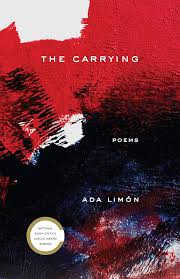
Lead-off batters. In baseball, they’re the table setters. The speed. The possibility and the hope facing a first pitch.
In a poetry collection, the first poem is no small matter, either. St. Billy of Collins says it is damn near everything when it comes to the Department of Importance (a branch of the Department of Interior, I think). All at once, the first poem sets the tone, the tenor, and the expectations for the anxious reader.
As Exhibit A, let’s look at Ada Limón’s collection, The Carrying. How does it begin, you ask? Softly, softly:
A Name
by Ada Limón
When Eve walked among
the animals and named them—
nightingale, red-shouldered hawk,
fiddler crab, fallow deer—
I wonder if she ever wanted
them to speak back, looked into
their wide wonderful eyes and
whispered, Name me, name me.
What strikes me about this opener is how unassuming it is. Limón has a penchant for lists, and we get one—emphasized between dashes, yet—right out of the gate. For themes, short poems do wonders. It’s like catching a whiff of something in the October air and trying to identify it. Is it identity? The female experience? How about nature, then?
Yes, yes, and yes.
The last line is almost childlike. “Name me! Name me!” It has an “I want to play, too!” slant to it.
Beyond that, simplicity all around. A few alliterative flourishes (fiddler crab / fallow deer, wide / wonderful / whispered), but hardly the poetic arsenal.
As for the line-break nazis, they’ll have to read it and weep: among, into, and all anchor lines in most unspectacular fashion. Most poets would park those at the beginning of the next line, but Limón seems little concerned with this “chicken or egg” game wherein the last word (no, the first word!) of each line is deemed supreme. In my view, it’s the poet’s prerogative. Period.
In any event, we can always look to the title for importance. Names are precious commodities. We have but one to protect and nurture, and it’s net worth beats any bank’s bottom line. How will we be named? How much control will be have over what comes to mind when people hear our name? And how much innocence does that name harbor, anyway? Is it (gulp!) an original sin waiting to happen?
Only Eden knows. And that snake, the lovely page, if the first poem does its job and tempts us to the second. And third. And so forth.
